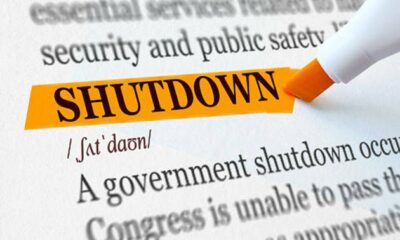World
House Lawmakers Return to End Record Government Shutdown

House lawmakers are set to return to Washington, D.C., on Wednesday after nearly eight weeks away, with the aim of concluding the longest federal government shutdown in U.S. history. The House will consider a bill that has already passed the Senate, which President Donald Trump hailed as a “very big victory.” This proposed measure is expected to gain support from the Republican-led chamber, although logistical challenges related to the shutdown may complicate the upcoming vote.
The House has not convened since September 19, when it approved a temporary funding measure to keep the government operational as the new budget year began in October. Following that vote, Speaker Mike Johnson sent lawmakers home, asserting that House Republicans had fulfilled their responsibilities. In the meantime, Democrats criticized their absence, framing it as a vacation while federal employees faced pay delays, travelers experienced airport disruptions, and food assistance benefits expired.
Many Democratic lawmakers are anticipated to oppose the legislation, primarily because it does not extend Affordable Care Act tax credits, which are set to expire at the end of this year. “Our strong expectation is that Democrats will be strongly opposed,” stated Democratic leader Hakeem Jeffries of New York, offering insight into the anticipated dynamics of the vote.
Johnson, a Republican from Louisiana, expressed optimism about the legislative outcome, stating, “Our long national nightmare is finally coming to an end, and we’re grateful for that.” He further emphasized the need for near-perfect attendance from Republican lawmakers to ensure the bill’s passage.
The proposed legislation aims to fund three bipartisan annual spending bills while extending federal funding until January 30. Despite the positive outlook, the shutdown’s impact continues to grow, marking Day 43 as lawmakers prepare for the vote. The Senate’s compromise measure includes support from eight senators who diverged from their party to endorse the bill after recognizing that Republicans would not agree to maintain the expiring healthcare tax credits.
The legislation also includes provisions to reverse the firing of federal workers that occurred during the shutdown and guarantees that federal employees will be compensated once the standoff concludes. Furthermore, it ensures continuous funding for key food assistance programs through the remainder of the budget year, directly impacting those who rely on such services.
Significantly, the bill allocates $203.5 million to enhance security for lawmakers and an additional $28 million for Supreme Court justices. Additionally, Democrats have highlighted a clause that allows senators to sue if a federal agency or employee searches their electronic records without prior notification, which could assist Republican lawmakers in their ongoing investigations related to former President Trump’s actions following the 2020 election.
Some Democratic leaders have expressed concerns regarding the potential ramifications of passing the bill. Senate Democratic leader Chuck Schumer noted that he could not “in good faith” support the measure after extensive discussions with his caucus. Similarly, Independent Senator Bernie Sanders, who aligns with the Democrats, characterized the decision to move forward as a “horrific mistake.” Senator Chris Murphy of Connecticut echoed these sentiments, urging Democrats to maintain their stance following recent electoral victories.
The path forward regarding healthcare subsidies remains uncertain. Although Johnson has not committed to a vote on extending the COVID-19 pandemic-era tax credits, some Republicans have indicated a willingness to consider the extension, albeit with new limitations on eligibility. Susan Collins, chairwoman of the Senate Appropriations Committee, expressed support for extending the tax credits with adjustments, highlighting the need for timely action before the year’s end.
As the legislative session approaches, both parties face challenges in reconciling their positions on healthcare subsidies, with significant implications for millions of Americans. The outcome of the anticipated vote will not only determine the immediate future of federal operations but will also shape the political landscape ahead of the upcoming midterm elections.
For ongoing updates and developments regarding the federal government shutdown, visit the Associated Press coverage at [AP News](https://apnews.com/hub/government-shutdown).
-

 Politics6 days ago
Politics6 days agoSecwepemc First Nation Seeks Aboriginal Title Over Kamloops Area
-

 World4 months ago
World4 months agoScientists Unearth Ancient Antarctic Ice to Unlock Climate Secrets
-

 Entertainment4 months ago
Entertainment4 months agoTrump and McCormick to Announce $70 Billion Energy Investments
-

 Lifestyle4 months ago
Lifestyle4 months agoTransLink Launches Food Truck Program to Boost Revenue in Vancouver
-

 Science4 months ago
Science4 months agoFour Astronauts Return to Earth After International Space Station Mission
-

 Technology3 months ago
Technology3 months agoApple Notes Enhances Functionality with Markdown Support in macOS 26
-

 Top Stories1 month ago
Top Stories1 month agoUrgent Update: Fatal Crash on Highway 99 Claims Life of Pitt Meadows Man
-

 Sports4 months ago
Sports4 months agoSearch Underway for Missing Hunter Amid Hokkaido Bear Emergency
-

 Politics3 months ago
Politics3 months agoUkrainian Tennis Star Elina Svitolina Faces Death Threats Online
-

 Politics4 months ago
Politics4 months agoCarney Engages First Nations Leaders at Development Law Summit
-

 Technology4 months ago
Technology4 months agoFrosthaven Launches Early Access on July 31, 2025
-

 Top Stories3 weeks ago
Top Stories3 weeks agoFamily Remembers Beverley Rowbotham 25 Years After Murder




















